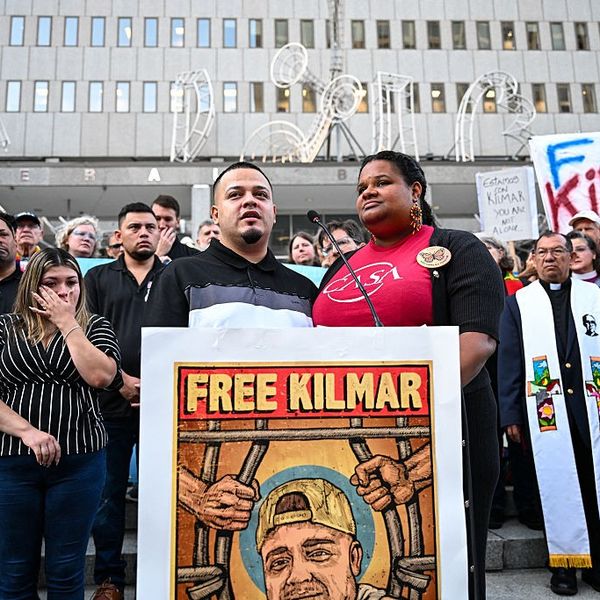While several of Texas' Southeastern cities are still enduring the heavy floods caused by Hurricane Harvey, immigrant advocates and undocumented residents breathed a sigh of relief on Wednesday night, when a federal district court temporarily halted a new state law that would ban sanctuary cities, just two days before it was scheduled to take effect.
"Senate Bill 4 would have led to rampant discrimination and made communities less safe."
--Lee Gerlernt, ACLU
In San Antonio, federal district court judge Orlando Garcia granted a temporary injunction, striking down most of Texas Senate Bill 4, or SB4, which would have required local law enforcement officers to carry out federal immigration law.
Critics have charged that this is the toughest immigration law the nation has seen since since 2010, when Arizona enacted a 'Show Me Your Papers' law that was later partially blocked by the Supreme Court.
Lee Gelernt, deputy director of the ACLU's Immigrants' Rights Project, who argued the case on behalf of immigrant rights groups as well as Texas city and law enforcement officials, called the law "patently unconstitutional" and praised the ruling.
"Senate Bill 4 would have led to rampant discrimination and made communities less safe," Gerlernt said. "That's why police chiefs and mayors themselves were among its harshest critics--they recognized it would harm, not help, their communities."
"This lawsuit united cities like Austin, Dallas, Houston and El Cenizo, with county officials, major law enforcement leaders, judges, and advocates for the nearly five million immigrants who call Texas home," said Lena Graber, a staff attorney at the Immigrant Legal Resource Center. "This law was never about good public policy--it was passed to criminalize nearly half of Texas, sweep immigrants into a deportation dragnet, and punish local law enforcement for not volunteering to do the job of federal enforcement agents."
Gerlernt's argument seems to have convinced Garcia, who wrote in his 94-page ruling that there "is overwhelming evidence by local officials, including local law enforcement, that SB4 will erode public trust and make many communities and neighborhoods less safe," ultimately concluding that "the state may not exercise its authority in a manner that violates the United States Constitution."
The ruling was celebrated by immigrants rights groups across the country.
It was also a relief for the communities most heavily impacted by the storm. The federal government came under fire last week, ahead of the hurricane, when it announced that it planned to keep immigrant checkpoints open during evacuations, effectively leaving undocumented immigrants "with an impossible choice on Friday: face the potentially life-threatening storm or follow evacuation orders and risk being detained and even deported," as Common Dreams reported.
Although the U.S. Immigration and Customs Enforcement later put out a statement emphasizing that "enforcement operations" would not be conducted at "evacuation sites, or assistance centers such as shelters or food banks," and some checkpoints were temporarily closed, many worry that the initial announcement spooked undocumented immigrants enough that some avoided seeking help during the storm.
In Houston, which has seen record rainfall and "catastrophic" flooding in the wake of Harvey, the Associated Press reports how "officials have sought to assure families fleeing the rising floodwaters in the nation's fourth-largest city that shelters would not ask for their immigration status." Noting that local law enforcement were relieved to hear about the ruling, the AP continued:
Houston police Chief Art Acevedo, an outspoken critic of the law, got word of the decision while standing inside a downtown convention center where about 10,000 people have sought shelter. He high-fived another officer.
"We needed a break. That's a break for us," said Acevedo, whose department has conducted thousands of high-water rescues and lost one officer who died in floodwaters as he tried to drive to work.
Despite the temporarily relief, Terri Burke executive director of the ACLU of Texas warns that the state legislature "has a reliable history of ignoring the constitution when writing law," and "we do not expect Gov. [Greg] Abbott or Attorney General Ken Paxton to yield easily."
"This fight isn't over yet," said Burke, noting the anticipated appeal, "so we call upon law enforcement, local officials, and supporters who have fought so hard to stop this law not to let up until SB4 is well and truly dead."



